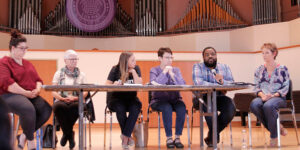Diversity, Inclusion Highlighted in Campus-wide Discussion
Faculty panel answers student-submitted questions amid backdrop of recent events on campus
September 29, 2017

On the Goodrich Chapel stage September 28 for the panel discussion were, from left to right, professors Ashley Feagin, Trisha Franzen, Carrie Booth Walling, Bille Wickre, Dominick Quinney and Nicolle Zellner.
By Chuck Carlson
At the end of the one-hour discussion in which difficult questions about white privilege, free speech and the power of words were asked, Dr. Carrie Booth Walling asked a favor of the students who had packed into Goodrich Chapel.
The Albion College political science professor wanted all of the students to look around at the students next to them.
“Now be silent, close your eyes and take a deep breath,” she said as the students murmured nervously. “The person next to you, they are the greatest miracle and the greatest mystery.”
She continued.
“The person next to you is surging to become something,” she said.
She continued.
“The person next to you is more than a label or a stereotype,” she said.
She spoke of the person next to each of them as being special and flawed and different and scared and brave and everything everyone strives to be and hopes never to be.
Then she concluded.
“The person next to you is a human being and just like you,” she said.
And the applause began and built.
So ended the discussion titled, “Our Campus Climate for Minority and Majority Students – The Value of Inclusivity, Diversity and Representation,” an event put together by the College’s Faculty Committee on Diversity.
Finding Common Ground
Though originally scheduled as the Common Reading Experience discussion for first-year students, the topic was changed to address the issues that have roiled the campus in recent days.
Last week, an email was made public that many students felt threatened their safety on campus. It was subsequently followed by a demonstration September 25 in front of Baldwin Hall that left other students feeling unsafe.
Further reports of students feeling unsafe eventually led to the College temporarily revising the code of conduct to strengthen penalties for students who were proved to have threatened other students. The September 28 discussion that filled the chapel will continue, in the immediate term, with small group discussions between faculty and students over the next few weeks.
The Goodrich discussion was moderated by committee members Dr. Nicolle Zellner of the Physics Department and Dr. Ashley Feagin of the Art and Art History Department. Along with Booth Walling, the panel included Dr. Dominick Quinney, professor of ethnic studies; Dr. Trisha Franzen, professor of women’s, gender and sexuality studies; and Dr. BIlle Wickre, professor of art and art history.
Aside from the first-year students and other students who gathered in the chapel, the event was also simulcast at other locations across campus.
And the topic, as Provost Marc Roy said as way of introduction, was “respect.”
“We can be better than the rest of the world around us,” he said. “We can learn and treat each other better. This is neither the first nor far from the last conversation.”
The panel answered student questions submitted ahead and ranged from “What is white privilege?” to “Where is the line between hate speech and free speech?”
And while the panelists suggested some answers would not be satisfactory to everyone, it was important and necessary to start a dialogue.
Wickre cautioned against “tribalism” and challenged students “to be open-minded and be willing to change your own mind.”
She added, “Educate yourself and don’t assume everything you see on social media is true.”
Franzen said it is important to talk about what we agree on, “but when there is something we don’t agree on, we need to know how to respond.”
She, too, challenged students to take a more active role in what they study and suggested they see a role in the curriculum-creation process.
“You can make things happen,” she said.
Quinney said arguments are part of the college experience. But arguing for the sake of arguing benefits no one.
“We need to go into an argument with the idea of not proving someone wrong but for gathering information,” he said. “We need to say, ‘I’m going in to understand the other person.’”
And Booth Walling added, “We’re missing an important opportunity as a liberal arts school if we’re afraid to engage in difficult conversations.”
A Necessary Step
Mike Harvey, ’19, a business and communication major from Detroit, said the discussion was worthwhile.
“It’s learning about the world and not just the campus,” he said. “Everybody’s different and has different opinions and we’re saying we’re not going to hate anybody, we’re going to love them. It’s like what Michelle Obama said, ‘When they go low, we go high.’”
For Albion College President Mauri Ditzler, this campus-wide event was a necessary and encouraging step forward.
He was out in front of Baldwin Hall during the demonstration and, later that night, answered questions from the Student Senate, several of whom identified themselves as conservative and questioned his decision to support the demonstrators.
He has also engaged by email and phone with parents of students, from all parts of the political spectrum, who are concerned about the safety of their kids on campus.
He watched the discussion from the balcony and was heartened by the response.
“I feel better about America and our campus,” he said afterward. “We had diverse faculty that found different ways to say the same thing and we have people engaged in difficult conversations. Disagreement isn’t bad and college should be the place where we learn to have difficult conversations. I enjoyed every minute of the conversation.”
UPDATE, September 29: An earlier version of this story incorrectly identified the members of the Faculty Committee on Diversity. The current members of the committee are Holger Elischberger, Psychological Science; Nicolle Zellner, Physics; Ashley Feagin, Art and Art History; Elizabeth Barrios, Modern Languages and Cultures; Keena Williams, Intercultural Affairs; and Marc Roy, Provost.